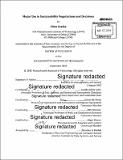Model use in sustainability negotiations and decisions
Author(s)
Czaika, Ellen Gail
DownloadFull printable version (13.35Mb)
Other Contributors
Massachusetts Institute of Technology. Institute for Data, Systems, and Society.
Advisor
Noelle Eckley Selin.
Terms of use
Metadata
Show full item recordAbstract
Sustainability negotiations and decisions require the integration of scientific information with stakeholder interests. Mathematical models help elucidate the physical world and therefore may orient the negotiators in a shared understanding of the physical world. Many researchers suggest collaborative modeling to facilitate integrating scientific information and stakeholder interests. In this thesis, I use methods that enable repeated instances of the same decision; the exploration of alternatives to model use (e.g. learning of a model's logic, relevant information, or irrelevant information); and the exploration of alternatives to collaborative modeling (e.g. using an expert model or not using a model). This thesis comprises two studies that use serious game role-play simulations. The first study is a computer-driven role-play simulation of governmental policy creation and the second is a five-party role-play simulation to negotiate a more sustainable end-of-life for used paper coffee cups. In the first study, model users reached the Pareto Frontier-the set of non-dominated points-more readily (13%) than non-model-users (2.5%) and model users discovered the win-win nature of electricity access with higher frequency (63%) than non-model users (9%). Participants who learned of the model's logic through presentation performed nearly as well as model users. In the second study, model use shortened the (mean) duration of the negotiation from 55 minutes to 45 minutes. Negotiating tables that co-created a model had a higher likelihood of reaching favorable agreements (44% compared to 25%). Model use did not significantly alter the value distribution among parties. Tables of negotiators used the model in two predominant manners: to test alternatives as they generated potential agreements and to verify a tentative agreement. The former resulted in higher mean table values than the latter. Together, these studies demonstrate: that mathematical models can be used in sustainability negotiations and decisions with good effect; that learning about the insights of a model is beneficial in decision making-but using a model is more beneficial; and that collaborative model building can provide better negotiation outcomes than using an expert model and can be faster than not using a model.
Description
Thesis: Ph. D., Massachusetts Institute of Technology, School of Engineering, Institute for Data, Systems, and Society, 2015. Cataloged from PDF version of thesis. Includes bibliographical references (pages 123-130).
Date issued
2015Department
Massachusetts Institute of Technology. Engineering Systems Division; Massachusetts Institute of Technology. Institute for Data, Systems, and SocietyPublisher
Massachusetts Institute of Technology
Keywords
Institute for Data, Systems, and Society.